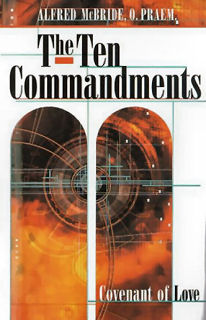
|
Posted February 22, 2010
Book: The Ten Commandments Author: Alfred McBride, O.Praem. St. Anthony Messenger Press. Cincinnati, OH. 2001. Pp. 191 An Excerpt from the Jacket:
An Excerpt from the Book: Fourth Commandment Family Values Honor your father and your mother. . . . Children, obey your parents (in the Lord), for this is right. It Takes a Neighborhood to Raise a Child The fourth commandment opens the second table of the Decalogue. . .[which deals with the love of neighbor]. . .God has willed that, after him, we should honor our parents to whom we owe life and who have handed onto us the knowledge of God. (Catholic Catechism, CCC 2197) Political speechwriter Peggy Noonan produced a family values program for PBS. She interviewed three people, all of whom said, “It takes a village to raise a child.” The image evoked nostalgic memories of storybook families in quiet rural settings, or in yeasty ethnic neighborhoods from the years before World War II, with two-parent families, two sets of grandparents and lots of aunts, uncles, cousins and neighbors. The spiritual heart of these villages and neighborhoods was the church or synagogue, with strong support from the local school, be it parochial or public. Garrison Keillor recovered that vision with gentle humor in his Prairie Home Companion sketches with his signature closing line, “And now we leave Lake Wobegone, where all the women are strong and all the men are good looking and all the children above average.” These idyllic scenes stir up memories of days when children were taught obedience and respect for parents, adults and public leaders, of times when the elderly were mostly cared for at home, of eras when father trained (and civilized) their sons – and mothers nurtured their daughters. Though village and neighborhood family life was not perfect, it reminds us of ideals. Such goals are sustained by the Fourth Commandment — and the commandments that follow — which outlines family and civic virtues designed by God for our happiness, fulfillment and peace. How Do You Honor Family Values? The Catechism of the Catholic Church presents us with these ways to support family values: – Renew the ideal of the family in society – Review the duties of parents and children to each other. – Support the Church’s Family Bill of Rights - Support the Church’s Family Bill of Rights (CCC, 2211,2234,2246) The importance of the family for the life and well-being of society entails a particular responsibility for society to support and strengthen marriage and the family. Civil authority should consider it a grave duty “to acknowledge the true nature of marriage and the family, to protect and foster them, to safeguard public morality, and promote domestic prosperity. Ideally, the family and society should support one another. In reality, this is not always the case. In some cases, governments enact laws that unjustly violate the essential rights of families (such as coercive abortions in China). There are cultures that fail to serve the family and violently attack family values. The failure of American law to supervise violent media entertainment is one instance. The forthcoming deregulation of TV in view of the imminent fiber optic “five hundred channels,” only signals a worse, not a better situation. In these cases, the family, which is the basic unit of society, becomes it victim. The Church openly and strenuously defends the rights of the family in the face of these oppressive measures of state and culture. The Synod of Bishops at Rome in 1980 issued a Bill of Rights on behalf of families. Here are some of them: The right to exist and progress as a family, that is, the right of every human being, even if he or she is poor, to found a family and to have adequate means to support it. The right to exercise its responsibility regarding the transmission of life and to educate children. The right, especially of the poor and sick, to obtain physical, social, political and economic security. The right to protect minors by adequate institutions and legislation form harmful drugs, pornography, alcoholism, etc. Table of Contents: Chapters 1 to 10: The Ten Commandments |
|
